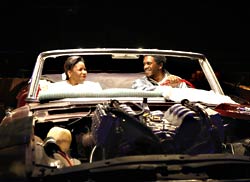The Mojo & the Sayso
Aishah Rahman’s play is a strange, slithering, beautiful piece of work, a dramatic chameleon that begins as one thing and ends as another, moving with the improvisational angst and joy of a deeply felt jazz riff. The second mainstage production in ACT’s Hansberry Project, which celebrates works by African-American playwrights, Mojo focuses on the travails of a single family sent reeling by the death of its youngest child, a 10-year-old who was shot in the back by racist police. Yet what begins as a fairly conventional story about a family trapped in the paralysis of grief goes through several startling contortions, including passages of outright satire and bayou-flavored magical realism. Valerie Curtis-Newton, artistic director of the Hansberry Project, directs with a sure touch, treating Rahman’s play more as a musical composition than a traditional stage work. If the play doesn’t quite seem to earn its final epiphany, it hardly matters. The ride is everything.
The cast is superb. Lindsay Smiling is riveting as Acts, the family’s paterfamilias, a man who has channeled every ounce of his pain into rebuilding the vintage Cadillac that sits like a monstrous metaphor in the family’s living room (this single set, by the way, is a stunning achievement by designer Jennifer Zeyl). Tracy Michelle Hughes plays Act’s wife, Awilda, for whom religion has become the sole source of comfort, and Jose A. Rufino plays older brother Blood, a would-be gangster obsessed with protecting his family from all threats. And Timothy McCuen Piggee has a hilarious turn as the Pastor, a golden-tongued scam artist angling for the uncashed wrongful-death check from the city that has the family racked by confusion and guilt.
Much less a unified, dramatic investigation of grief and healing than a kind of sustained dialogue that ebbs and flows along a single theme, Rahman’s play captures a wild intensity of feeling among these shattered people searching for a reason to keep on. This is the mojo in question—that certain something that helps the weary and afflicted through tough times. The play itself, quite unlike ACT’s usual fare, provides a kind of mojo, offering theatergoers a song of hope that purrs and revs like the gleaming Cadillac that finally carries the family into a new, better day.
The Summer Before The Summer of Love
A good measure of artistic success is the achievement of what one sets out to do—accomplishing a set of stated or unstated goals. By this standard alone, Theater Schmeater’s current production of The Summer Before the Summer of Love commits a pretty thorough face-plant, failing to engage its subject matter in any substantial or convincing way. A romantic comedy set during the dawning of the Age of Aquarius, Scot Augustson’s play feels like a thin and rather listless exercise in revisionist nostalgia. And yet, historically speaking, there’s no there there. Save for its title and a strategically placed sunburst dial that evokes the middle-class appropriation of psychedelic culture, the play scarcely touches upon the decade in question—it’s a narrative in a vacuum, set in a summer that could be any summer at all. Into this oddly flat and frictionless atmosphere Augustson inserts a pair of gay lovers, apparently believing this to be enough of a fillip to spark a new and interesting take on the so-called era of free love. Confronting the storied liberalism and sexual license of the ’60s in a manner at once so political and deeply personal is a brilliant conceit, but the play is so bereft of cultural signifiers—either on its surface or in its deeper content—that the love story feels sketched and two-dimensional, as though awaiting a full palette of color and an artist’s brush.
The story focuses on lovers Greg (John Gonzalez) and Vic (Chris Haddad) and their various friends and acquaintances. The setup is essentially sitcom stuff, involving the uncertainty and insecurity of both parties as they second-guess each other’s meanings and intentions. Director William Cole handles the material in a fairly straightforward manner, and there are some quiet, touching moments that capture the giddy, nervous thrill of early romance, but in the end the generally anaerobic atmosphere leaches any spunk or vigor from the proceedings. Even the introduction of some noir elements—a random death, deception, a salvational trip to Alaska, and a gun—don’t help. Augustson is a talented writer, but the cast is clearly uneasy with the material. Because of this, The Summer Before the Summer of Love never finds proper daylight.








